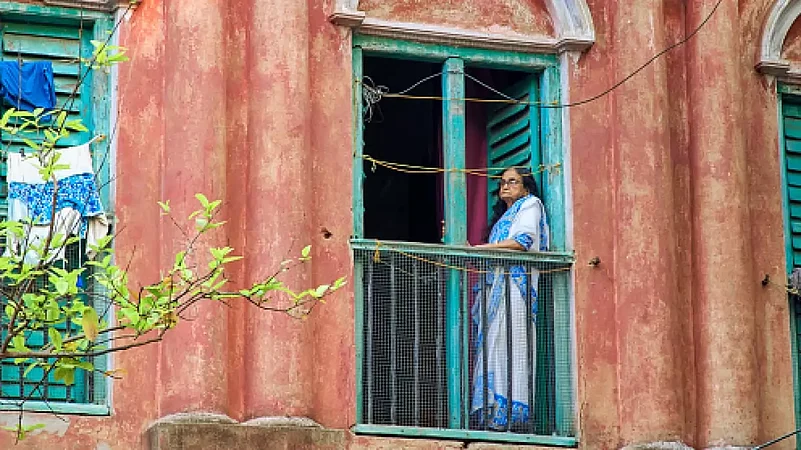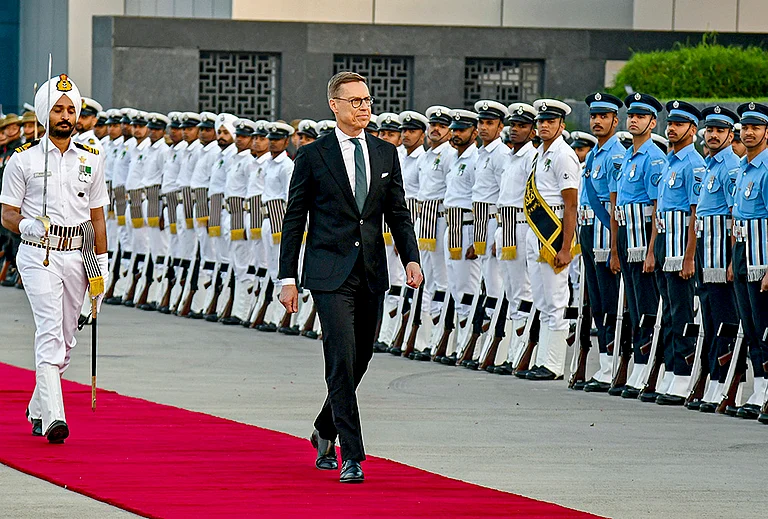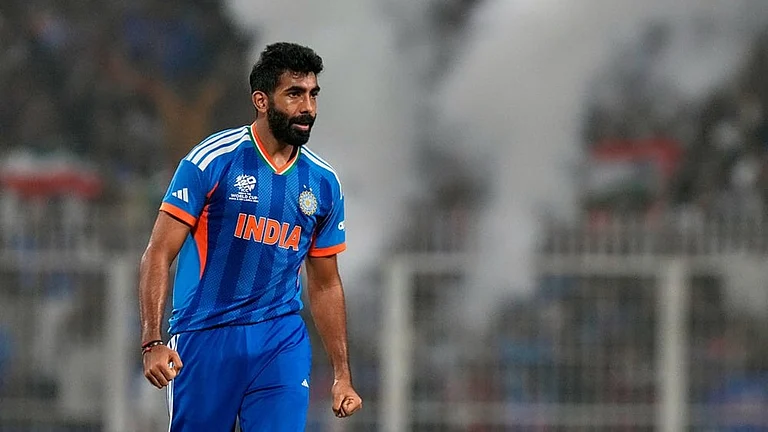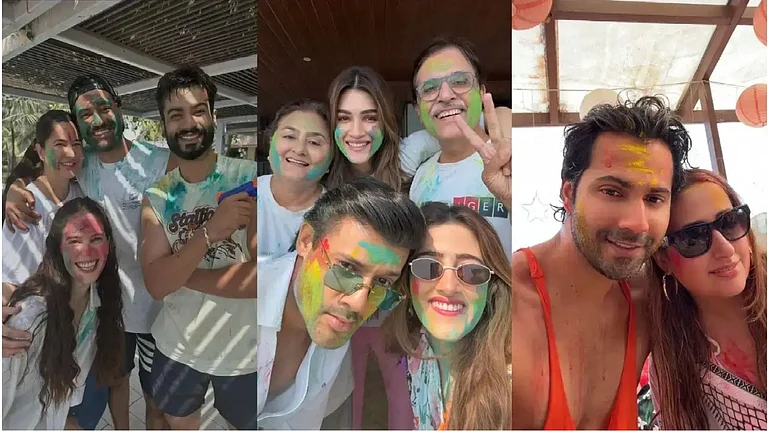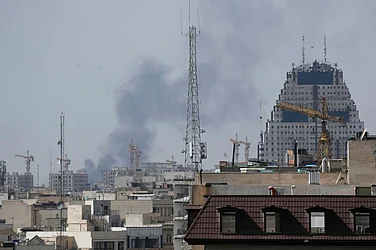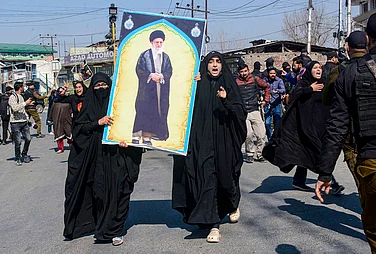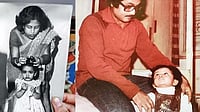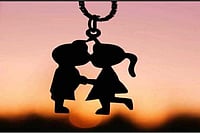Memory is a strange beast.
The same memories that draw you closer to a person can also tear you apart, annihilate you. Memories bear no guarantees—there are only gates to enter, none to exit. Memories, like prison guards of war, hold time hostage. Growing up, I had no tangible memories of my biological father, Basudev Kundu, and yet, it was in his shadow that my entire childhood, practically, was spent. Defined by his looming absence and all the things it breathed to me, even as he himself could say nothing, which is how I learnt to fill in the vacuous spaces. The word ‘late’ was prefixed everywhere before his name—on my passport, school and college certificates; in conversations, amongst nosy relatives; at boisterous birthday parties and lavish family weddings; and in my mother’s pensive silences. My ancestral home located in a shaded by-lane in posh South Kolkata belonged to my maternal grandparents and bore no signs of my father’s existence. Nothing except a large sepia photograph encased in a steel frame in a sprawling puja room on the mezzanine floor, placed alongside a retinue of dead ancestors caged similarly in the same style of photographs—a moustached man with a pouty mouth and intense dark lashes, staring back piercingly in my direction.
From the first time I ever really took notice of the similarities between us, I found myself questioning who he might have been. Who was this man who looked so much like me? Was he a relative, someone close or distant? I had no inkling what the word ‘late’ really meant. The dead have no voice or vocabulary to offer their versions of the story. And so, the word ‘late’ only added to the suspense and inquisitiveness festering in my young, restless mind. No one breathed a word about his demise to me, either. What was the ailment that had robbed a young life such as his? It was assumed, perhaps, that I would piece it together on my own when I was older, the puzzle of an absentee father. Maybe, looking back now, the secrecy was intended to protect me.

Baba shot himself in his ancestral home in Midnapur, a district in our home state of West Bengal, a year or so after he was diagnosed with schizophrenia and started undergoing psychiatric treatment. He passed away on the auspicious occasion of Lakshmi Puja, when I was four.
I was born on 14 December 1977, a wintry Wednesday morning, after a complex C-section. Everything I had gathered about Baba during my growing-up years was essentially from eavesdropping on adult conversations—catching fleeting snatches of an almost invisible man before I was inevitably discovered. I could not help but notice how uncomfortable everyone got in my presence, as if they were hiding something. Baba remained largely pieced together by a fertile childhood imagination and the longing for a superhero, I suppose. Someone to fill in the blanks; to look up to and find a resemblance in, not just physical, but one that would protect me, offer answers and fix things as I grew up. The first time I knew Baba was a person, albeit missing, was when I spotted rows after rows of silk ties and woollen blazers hanging inside an antique teak almirah in my grandparents’ bedroom I surmised could not belong to Bapi, my maternal grandfather.
Photo albums squeezed into the lowest shelf inside Ma’s cupboard bore portraits of her bedecked in a rich Benarasi sari, a wispy veil placed over her head, as she smiled demurely, her neck weighed down heavily by expensive ornaments. Ma looked petrified as she took her place beside a young man with broad shoulders, clad in a white silk kurta, looking furtive as they stood facing a yellowish-green flame leaping out of the ceremonial fire. I caught Ma rummaging through piles of handwritten letters that lay stuffed inside discoloured cardboard boxes stacked alongside these albums, signed off with ‘Yours, Basu’.
Ma and Baba had met while studying at Presidency College, their alma mater. Ma was a student of zoology and Baba, of English literature. He was a year senior to her. Ma had chosen him against the initial wishes of her mother who I referred to as Mamma—an upper-caste Kayastha woman of rich pedigree who had herself fallen in love with a Brahmo man who belonged outside the strict ‘Lakshman rekha’ of her faith and veritable bonedi lineage, which, translated into English, connoted that they were illustrious and moneyed. A street in North Kolkata is named after Mamma’s paternal great-grandfather, Dr Jagabandhu Bose, who was one of the founders of R.G. Kar Medical College and Hospital where he served as its first president and as a professor of pharmacology. In 1895, he helped found the College of Physicians and Surgeons of Bengal and served as its first president. In Dandirhat village, under the Basirhat subdivision in the 24 Parganas (North) district of our home state of West Bengal, the famous ‘Dactar Barir Puja (Puja at the doctor’s house)’, founded by Mamma’s family is still running.
Mamma’s roots could be traced back to the pompous zamindars who thrived during the decadent Babu culture of nineteenth-century Bengal, romanticised in folklore as the owners of marble mansions, Belgian chandeliers, horse-drawn carriages, opulent bagan baris (country homes) on the outskirts of the city, and buxom mistresses with paan-stained, ruby lips and swaying bottoms. By contrast, Baba was a small-town graduate with conservative parents, who had given Mamma ‘bad vibes’ the first time she travelled to his hometown to formalise Ma’s marriage. This was much after she had staged a walkout when Ma had first broken the news of wanting to settle down, disappointed at the contrasting cultural asymmetry between the two families.
‘Shomane shomane biye korbe (Always marry amongst equals)’ was Mamma’s pet refrain to me.
My paternal grandmother also disapproved of Ma and the fact that Baba had not just selected his own partner but had also decided to tie the knot immediately after his probationary period in a nationalised bank, his first job, and bypassing his elder brother, who was a bachelor then. She chose not to bequeath Ma any jewellery, which was customary from the groom’s family, on their wedding. Perhaps she feared losing control over her younger son, her favourite—a patriarchy-induced insecurity that most Indian mothers with sons secretly harbour. She went on to harass Ma with petty interferences such as not allowing her to sleep with her husband after their nuptials and whenever they visited his parents or vice versa.
Ma was raised in an Anglicised and well-heeled family based in a big city and her exposure to art, intellect, food and travel stuck out like a sore thumb, adding to the fissures in her troubled relationship with her mother-in-law, who was very different. Neither could ever share Baba or the love they bore for him and this remained a constant bone of contention between them. Baba’s elder brother also chose his own match and migrated shortly afterwards to the USA. He did not even fly down to see his mother’s mortal remains after Baba died by suicide.
Ma’s early marriage compelled her to turn down a prestigious scholarship in the UK for a biology teacher’s job at her own school, Loreto House, an all-girls convent in the city of her birth.
The rush of their swooning college romance withered away bit by bit as the harsh realities of matrimony seeped in. Her relationship with Baba disintegrated into immense inward and outward struggle, riled with the gnawing financial and emotional perils young couples are vulnerable to, unprepared for life, despite the headiness of their attraction towards each other. Baba and Ma had always been different people, belonging to different socio-economic and cultural worlds, possessing diametrically opposite natures, their differences looming over them like an evil portent.
Had they both known that their love was doomed from the start? Was that why Baba and Ma looked so strangely distant on a day when they were, perhaps, the closest? In not a single one of the wedding photos was either of them smiling. It felt like a sign, an omen.
Ma wore red for the last time when Baba left her parents’ home, which was where she moved after separating from him, leaving their flat, cradling their asthmatic child in her arms on a freezing December night in a rickety rickshaw. Baba’s careless drinking and endless socialising had worn Ma down. There were also other indiscretions.
‘Ek kapore (Taking nothing more),’ Ma often ruminates even now, her lower lip trembling. Her last memory of Baba was him gently goading her to grant their fractured marriage a fresh start. He wanted to teach and not work in a high-pressure foreign bank environment, which is where he had transitioned to, as part of the prestigious Forex division. Baba expressed a desire to spend his time raising Bapsa, a name my parents had lovingly bestowed upon me. My parents were estranged by then. Ma had suffered a miscarriage before I was born; she worked until the week before her delivery, a few years later when she was expecting me, cooking for Baba’s friends with her pregnant belly almost touching the stove and correcting term papers, all night. Like scores of women who marry on their own terms, Ma was way too proud to ever reveal the cracks in her marriage to her parents or tell them how self-destructive Baba had become.
Slowly, Baba, a man so bright, so cherished and popular among his friends, who had wooed a woman from an upper-middle-class family, had married her and was keen to have a family of his own, betrayed his own heart. Maybe it was his mind that robbed him of stability, his sanity…and Ma. Baba returned to her life and mine just as suddenly as he would finally depart. He was disoriented and remarkably weaker on that stormy evening, a couple of years into their physical separation. He had shaved his head and was in the company of a tantric. It was apparent he had lost his mental bearings.
It was Bapi’s decision to take him in. ‘He is the father of your daughter…and a very sick man…’ he convinced Ma, after which the next few months were a blur.
Consumed by psychiatrists, institutional rehabs, mounting debts, removing chitkinis (latches) from the doors and replacing pyjama drawstrings with elastic, storing away all sharp objects, lest he self-harms when in isolation using what he could find at home, Bapi slept on the floor, dutifully guarding Baba, who tossed and turned under a shadowy mosquito net in our South Kolkata home, every single night. Travelling with Ma, Bapi ferried Baba to therapy on a ramshackle minibus, somewhere outside Kolkata. Taxi fares proved to be too steep to sustain, alongside my education and upkeep. Ma was teaching full-time and also giving tuitions to make ends meet.
Back home and on the insistence of her father, whom she adored, she slowly graduated to Baba’s primary caregiver, bathing him, administering his medicines and guarding him, protectively, proactively. Perhaps even learning to accept him in this new light, as a very different man, with the graceful compassion of a caregiver, sans any expectations or complaints about their broken marriage. Alongside taking care of her ageing parents, Ma took charge of all the bills and doctor’s appointments. Mamma, on the other hand, cooked Baba his favourite kosha mangsho and luchi, spending balmy evenings chatting with him—about music, cinema and travel—three of his pet subjects. Waiting, as Ma was probably, for Baba to return as a lover, a husband, a father, a son, a son-in-law, a professional, a whole person.
Baba’s elder brother, who I heard being referred to as Jethu, who technically should have been as involved in his brother’s raging mental health problems, sent Ma a few dollars when she reached out, narrating how his diagnosis was pointing in the direction of childhood trauma, a part of Baba’s life Ma knew very little of. She had not been informed of the darkness lurking in the corners of Baba’s mind by any of his family members when she had tied the knot, especially about his earlier attempts at self-harm.
After months of rehabilitation and talk therapy, still in its nascent stages back then in India, Baba expressed a sudden, pressing desire to visit his parents once. Bapi immediately called to forewarn them that he could slip back anytime, reiterating how his psychiatrist had strictly advised that any sharp objects at home—or anything like a rope, a knife, a gun—be stowed away.
Especially if the gun was fully loaded.
No one asked why or what the last argument between Baba and his parents may have been or what precipitated his slipping back into suicidal thoughts. He was cremated on the same day, in the town of his birth. Ma was advised to instigate police proceedings against her in-laws for abetment of suicide. She chose not to, for my sake, and possibly for the sake of her elderly parents, who were devastated and in a state of crippling shock. It was not until after my sixteenth birthday that I came to know the full truth, after my mother’s paternal first cousin, a friendly uncle, blurted out the details of Baba’s suicide on the evening before my class ten boards. He shattered the impenetrable silence shrouding my father’s existence until then and the steadfast imaginary father figure whom I hero-worshipped and hid behind.
In my first letter to Baba—letter-writing was a habit that I had kept up all through my school life in the same convent that my mother had studied and then taught at, and until my uncle’s shocking revelation—I just wanted to know one thing. A question that continues to haunt me for close to four decades now.
More than if Baba loved me.
Would I ever be more? More than a daughter?
*****
As in most average, middle-class Indian families who lack access to trauma counselling and are unversed with the right vocabulary to discuss mental health and suicide with the child of a deceased parent, Baba’s untimely death, caused by what I now view as a cancer of the mind, remained a taboo subject which no one really touched or dwelled upon. Maybe the grief was overwhelming. Simply surviving, answering the invasive questions society imposes on survivors, the resultant blame game, the sweeping assumption and subsequent allegations that the wife of the deceased must be responsible for his mental anguish. Very few relatives from my father’s family reached out to support Ma in navigating her personal traumatic tragedy as she was abandoned all over again, most of Baba’s relatives and friends disappearing from our lives, one by one.
Ma and her parents mourned privately, away from everyone, desperate to reclaim some of the dignity and respectability that suicide robs the deceased and their immediate family of. Hiding as part of a laborious ritual to move on must have felt easier. Not talking about someone or something—a rehearsed avoidance practice that I now believe is but a weak coping mechanism—was slowly normalised into a lack of forthright conversation with me. I am not sure we ever forgot Baba. But he was banished from our lives.
The first person to use the word ‘father’ in my presence happened to be my kindergarten teacher, Mrs Wilde, as she pointed towards a sunny Kolkata skyline and claimed that my dead father was now a star. There were none then, and so like most children who are protected from discussing death and processing the grief and consequences of such statements that are actually way more layered and uncomfortable for the adults than them, I sanguinely nodded my head, pretending to understand. The truth is, I knew she was lying because a real person never becomes a star and leaves without a proper goodbye; that a father should not.
And so, when the girls in my posh school posed interrogations as to why Baba never came to pick up and drop me or attend parent-teacher meetings, or cheered for me during school concerts, I was forced to wonder.
Who was he? What did he look like? Where was he?
What did he do for a living?
Were we happy?
Was he a good father?
I was about seven or eight when I picked up a new habit birthed out of a fear of bullying, and later, selfish self-preservation and a sense of shame—I turned into a compulsive liar.
Ma taught at the same school and maintained emotional distance from me when I was younger. It was as if she feared I would recognise her anguish decades before we collectively mourned the one man who shaped our destiny, both through his presence and absence.
And so I never brought up Baba in conversation with her either, conjuring a new story every day, every week, every year. Maybe in doing so, unconsciously, I was also protecting my mother. I had been witness to how she was ostracised at social gatherings like the gaye halud ceremony of an aunt or the shaadh (baby shower) for one of her sisters-in-law, where every pretty and perfect and pious thing was bestowed only upon an eyo stree (a married woman). A widow’s presence evoked sympathy, but her participation was deemed inauspicious—blaming a woman, perhaps, for the death of her spouse, for whose long life women are meant to fast, starve, pray and worship. And so no one consoled Ma or celebrated her personhood, which should have mattered over and above her marital status, by allowing her to participate simply as one woman celebrating another. Baba’s suicide scarred everyone. Hushed whispers stirred up every time Mamma took me to family functions, where the first comment was inevitably about my striking resemblance to him. Comments that never made me feel proud or beautiful or confident, but stuck out instead as snide, adding to the mystery of his absence. I grappled with a gnawing emptiness as the years wore on, about who I really was and who was Basu (which is what everyone called my father). I didn’t have a familiar-looking face to look up to as an ally or a tangible memory to return to, of the things we may have done together, or even a storyline of his life. Also, I was extremely conscious that someday, one of my overtly curious classmates might decide to interrogate Ma and then hound and humiliate her, or laugh behind her back, denting her reputation as one of Kolkata’s best biology teachers and compromising her professional identity, and by extension, my standing in class.
For the longest time, I didn’t have any inkling of what my father’s profession was either. But, I thought of him as a banker long before I knew anything about him in much detail. Maybe, it was the photograph with the tie and the crisp, ironed formal shirt with tiny, sandalwood spots merging with the fine creases around his eyes. I didn’t know that Baba had travelled to Europe or that he loved travelling, food, open skies, music, books; the cobbled streets of Greece, the double-decker buses in London, the ruins of ancient Rome; the rush and romance of life.
*****
Shanti Mashi was a dark-complexioned Santhal child widow recruited to help raise me. She came into my life when I was about seven months old. Her sunken bosom comforted me, as her weathered hands carried my meals and lifted my school bags; her thick lips whispered stories to me at night when the power suddenly went off. A child bride who had lost her older-by-a-decade husband in her early teens and never borne her own child, Shanti Mashi spent her entire adult life taking care of other people’s children—rich people’s children. One night, I was roughly pulled into a room by Shanti Mashi and the door was banged shut behind me. She was very nervous and kept trying to cover my eyes. I pretended to keep them shut and hid my face in her stomach. But there was quite a commotion outside, in the dining area. A man, heavily intoxicated, was charging towards Bapi, hurling abuses. He held a coloured glass bottle, half-broken and was slurring and slipping. Mamma was trying to protect Ma and both of them broke into sobs while trying to push the man away from Bapi.
‘Oye dushtu lok ta ke (Who is that wicked man)?’ I asked, bursting into tears myself, scared for Bapi’s life.
I imagined we were being robbed. Dacoits were quite commonplace back then in South Kolkata. Shanti Mashi was highly perplexed and kept trying to prevent me from seeing what was going on.
‘Na na…dushtu lok noi…ota tomar Baba...(No no, that is your father, not a wicked man).’
(Sreemoyee Piu Kundu is a bestselling author of five books, including India's first feminist erotica, Sita's Curse.)



